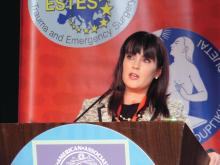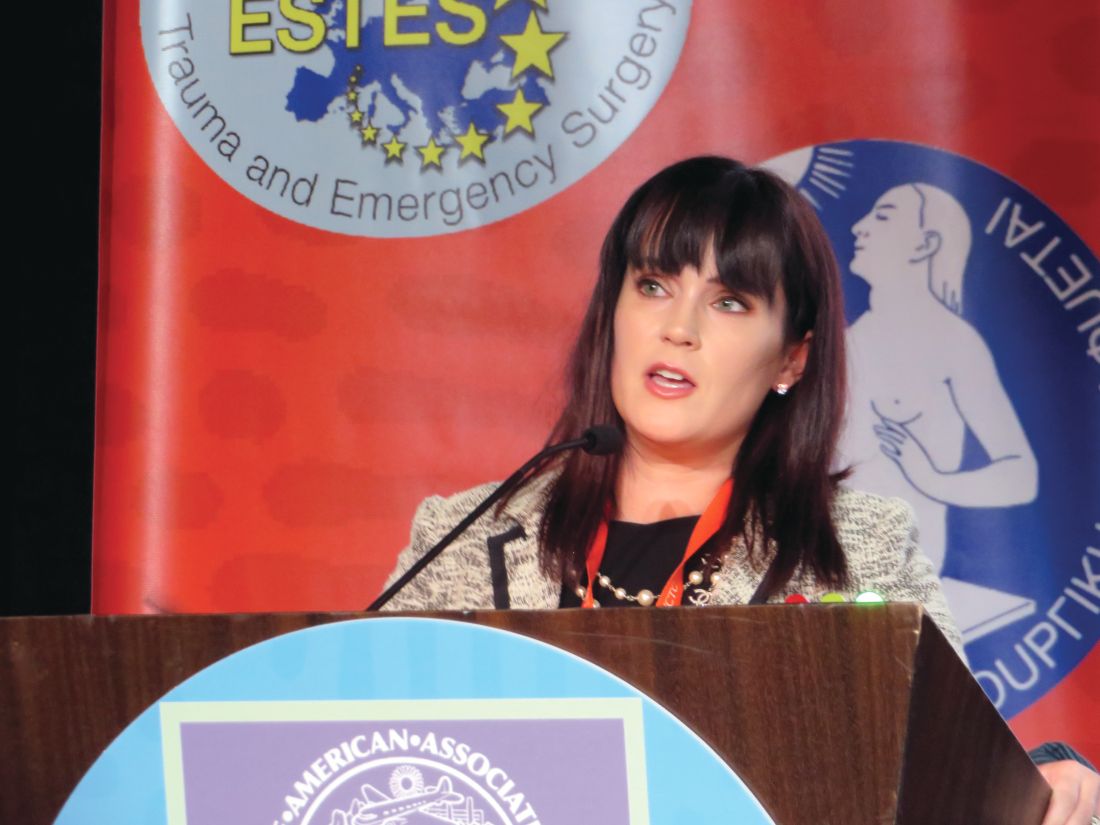User login
SAN DIEGO – Almost 70% of surgeons who pull in-house call duty may be sleep deprived, Jamie Jones Coleman, MD, said at the annual meeting of the American Association for the Surgery of Trauma.
Even extra sleep the night after call doesn’t even things out, said Dr. Coleman of the University of Colorado, Denver. Her prospective study found that it takes 3 nights for sleep patterns to return to normal – a potential problem for surgeons who have frequent on-call nights.
“Sleep deprivation slows reaction time, decreases fine motor coordination, and increases the risk of chronic disease,” said Dr. Coleman. “A single period of 24 hours without sleep results in a neurocognitive performance that’s similar to having a blood alcohol content of 0.1%. It’s also associated with decreased empathy and increased depression. We need to take this issue seriously.”
Dr. Coleman measured sleep hours and architecture on 17 surgeons over 3 months, collecting data on 1,421 nights. Each surgeon wore a biometric measuring device called “Whoop” for the entire study. Worn on the wrist, the device measures heart rate, heart rate variability, and movement 100 times per second. It also records sleep onset and termination and can determine stages of sleep (light, slow wave, and REM).
In addition to wearing the device, the subjects also recorded all of their call schedules. The study compared sleep patterns on pre-call day 1 to those on post-call days 1, 2, and 3. Acute sleep deprivation was defined as two or more cycles of slow-wave sleep before REM; chronic sleep deprivation was one or more cycles of REM before slow-wave sleep onset.
Most of the subjects (65%) were men; the mean age was 45 years. Of the 1,421 nights recorded, 227 were on-call. Surgeons were already getting fewer hours of sleep than generally recommended, averaging 6.5 hours excluding call nights.
Subjects tried to “catch up” on sleep the day after call, Dr. Coleman said. On the day before call, they recorded an average of 6.4 hours of sleep; that increased to about 7 hours on post-call day 1. On post-call day 2, the average sleep time was about 6.3 hours, and increased to 6.5 hours by the third day.
Most of these recovery nights (70%) had abnormal amounts of REM sleep; 56% had abnormal amounts of slow-wave sleep. The majority of subjects (65%) showed patterns that qualified as either acute or chronic sleep deprivation.
“A recent study of football players found that correcting sleep issues was associated with both decreased alcohol consumption and decreased injuries,” Dr. Coleman said. “Well, we are being injured too. Shouldn’t surgeons take this as seriously as people who throw a ball for a living?”
She had no financial disclosures.
msullivan@mdedge.com
SOURCE: Coleman JJ et al. AAST 2018, Abstract 29.
SAN DIEGO – Almost 70% of surgeons who pull in-house call duty may be sleep deprived, Jamie Jones Coleman, MD, said at the annual meeting of the American Association for the Surgery of Trauma.
Even extra sleep the night after call doesn’t even things out, said Dr. Coleman of the University of Colorado, Denver. Her prospective study found that it takes 3 nights for sleep patterns to return to normal – a potential problem for surgeons who have frequent on-call nights.
“Sleep deprivation slows reaction time, decreases fine motor coordination, and increases the risk of chronic disease,” said Dr. Coleman. “A single period of 24 hours without sleep results in a neurocognitive performance that’s similar to having a blood alcohol content of 0.1%. It’s also associated with decreased empathy and increased depression. We need to take this issue seriously.”
Dr. Coleman measured sleep hours and architecture on 17 surgeons over 3 months, collecting data on 1,421 nights. Each surgeon wore a biometric measuring device called “Whoop” for the entire study. Worn on the wrist, the device measures heart rate, heart rate variability, and movement 100 times per second. It also records sleep onset and termination and can determine stages of sleep (light, slow wave, and REM).
In addition to wearing the device, the subjects also recorded all of their call schedules. The study compared sleep patterns on pre-call day 1 to those on post-call days 1, 2, and 3. Acute sleep deprivation was defined as two or more cycles of slow-wave sleep before REM; chronic sleep deprivation was one or more cycles of REM before slow-wave sleep onset.
Most of the subjects (65%) were men; the mean age was 45 years. Of the 1,421 nights recorded, 227 were on-call. Surgeons were already getting fewer hours of sleep than generally recommended, averaging 6.5 hours excluding call nights.
Subjects tried to “catch up” on sleep the day after call, Dr. Coleman said. On the day before call, they recorded an average of 6.4 hours of sleep; that increased to about 7 hours on post-call day 1. On post-call day 2, the average sleep time was about 6.3 hours, and increased to 6.5 hours by the third day.
Most of these recovery nights (70%) had abnormal amounts of REM sleep; 56% had abnormal amounts of slow-wave sleep. The majority of subjects (65%) showed patterns that qualified as either acute or chronic sleep deprivation.
“A recent study of football players found that correcting sleep issues was associated with both decreased alcohol consumption and decreased injuries,” Dr. Coleman said. “Well, we are being injured too. Shouldn’t surgeons take this as seriously as people who throw a ball for a living?”
She had no financial disclosures.
msullivan@mdedge.com
SOURCE: Coleman JJ et al. AAST 2018, Abstract 29.
SAN DIEGO – Almost 70% of surgeons who pull in-house call duty may be sleep deprived, Jamie Jones Coleman, MD, said at the annual meeting of the American Association for the Surgery of Trauma.
Even extra sleep the night after call doesn’t even things out, said Dr. Coleman of the University of Colorado, Denver. Her prospective study found that it takes 3 nights for sleep patterns to return to normal – a potential problem for surgeons who have frequent on-call nights.
“Sleep deprivation slows reaction time, decreases fine motor coordination, and increases the risk of chronic disease,” said Dr. Coleman. “A single period of 24 hours without sleep results in a neurocognitive performance that’s similar to having a blood alcohol content of 0.1%. It’s also associated with decreased empathy and increased depression. We need to take this issue seriously.”
Dr. Coleman measured sleep hours and architecture on 17 surgeons over 3 months, collecting data on 1,421 nights. Each surgeon wore a biometric measuring device called “Whoop” for the entire study. Worn on the wrist, the device measures heart rate, heart rate variability, and movement 100 times per second. It also records sleep onset and termination and can determine stages of sleep (light, slow wave, and REM).
In addition to wearing the device, the subjects also recorded all of their call schedules. The study compared sleep patterns on pre-call day 1 to those on post-call days 1, 2, and 3. Acute sleep deprivation was defined as two or more cycles of slow-wave sleep before REM; chronic sleep deprivation was one or more cycles of REM before slow-wave sleep onset.
Most of the subjects (65%) were men; the mean age was 45 years. Of the 1,421 nights recorded, 227 were on-call. Surgeons were already getting fewer hours of sleep than generally recommended, averaging 6.5 hours excluding call nights.
Subjects tried to “catch up” on sleep the day after call, Dr. Coleman said. On the day before call, they recorded an average of 6.4 hours of sleep; that increased to about 7 hours on post-call day 1. On post-call day 2, the average sleep time was about 6.3 hours, and increased to 6.5 hours by the third day.
Most of these recovery nights (70%) had abnormal amounts of REM sleep; 56% had abnormal amounts of slow-wave sleep. The majority of subjects (65%) showed patterns that qualified as either acute or chronic sleep deprivation.
“A recent study of football players found that correcting sleep issues was associated with both decreased alcohol consumption and decreased injuries,” Dr. Coleman said. “Well, we are being injured too. Shouldn’t surgeons take this as seriously as people who throw a ball for a living?”
She had no financial disclosures.
msullivan@mdedge.com
SOURCE: Coleman JJ et al. AAST 2018, Abstract 29.
REPORTING FROM THE AAST ANNUAL MEETING
Key clinical point: On-call duty disrupts sleep for many surgeons.
Major finding: About 65% qualify as having acute or chronic sleep deprivation.
Study details: The prospective study involved 17 surgeons.
Disclosures: Dr. Coleman had no relevant financial disclosures.
Source: Coleman JJ et al. AAST 2018, Abstract 29.

